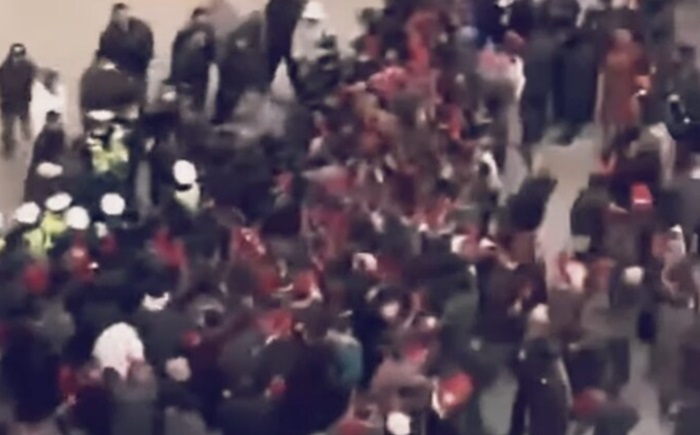
Chinese authorities arrested more than 1,000 Tibetans in one day in a sweeping crackdown after unprecedented mass protests erupted nearly two weeks ago.
Hundreds of monks and local residents took to the streets to protest at government plans to demolish at least two villages and six monasteries, displacing thousands of Tibetans, in order to construct a hydroelectric dam.
Chinese police responded to protesters with tasers, water cannon and pepper spray, arresting at least 100 people on Thursday, rights groups said.
Then, on Friday, authorities arrested more than 1,000 Tibetans in Derge, a major centre for Tibetan culture and history, and also where the dam is due to be built.
Short video clips have emerged of Chinese police forcibly restraining and knocking down Tibetan Buddhist monks in dark red robes.
Chinese government censors, however, have quickly scrubbed mentions of the protests and ensuing crackdown within China itself.
Local residents have reportedly had their phones confiscated, and key search terms such as “Derge dam protests” have been blocked on Chinese internet search engines.
Such public demonstrations are very rare in China – strict government surveillance both physically and digitally makes it difficult for groups to organise, and doing so carries a great risk of torture, arrest, and possibly death.
The protests in Derge are unprecedented, and could be the largest demonstrations since mass rallies rocked China in late 2022 when people peacefully took to the streets to rally against three years of tight Covid restrictions.
“The events in Derge are an example of Beijing’s destructive policies in Tibet,” said Kai Müller, managing director of the International Campaign for Tibet, in a statement. “The Chinese regime tramples on the rights of Tibetans and ruthlessly and irretrievably destroys valuable Tibetan cultural assets.
“Beijing’s development and infrastructure projects are not only a threat to Tibetans, but also to regional security, especially when it comes to water supplies to affected Asian countries.”
Tibetans from Derge living in other parts of China have travelled back to their hometown to press for the release of their detained relatives, though rights groups say they’ve been detained as well.
Detainees were instructed to bring their own food and bedding – a sign that people rounded up could be held for a prolonged period of time.
Derge is considered a centre for Tibetan culture and history, and is home to monasteries with murals dating back to the 13th century. A printing press attached to a monastery in Derge has also long been the site of pilgrimages.
In recent days, some Tibetans have been protesting in solidarity in India’s Dharamsala, where the Dalai Lama lives in exile, and also at Chinese embassies and consulates in the US and Europe, to draw public attention to the issue.
“Criminalised for defending their homes and environment, Tibetans inside Tibet are risking their lives by sharing videos on social media exposing the reality of Tibet under occupation of the Chinese government,” Chemi Lhamo, campaigns director of Students for a Free Tibet said in a statement.
“This displacement of thousands of indigenous peoples that have stewarded their ancestral lands for millennia is a human rights and a climate justice issue.”
The Chinese government has long sought to bring Tibet to heel over concerns that there might be separatist movements posing a political challenge to the ruling Communist Party.
In response, Beijing has for decades installed economic development programmes in hopes of maintaining stability in the region, though it has been done at the expense of Tibetan homes and monasteries, key to the region’s history and culture. (Telegraph)
